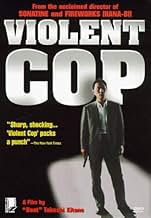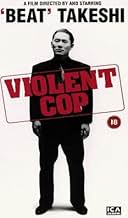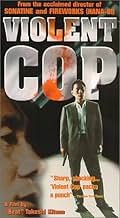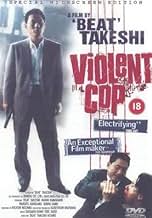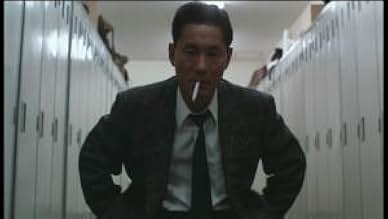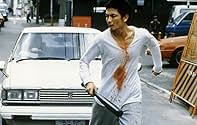VALUTAZIONE IMDb
7,1/10
13.582
LA TUA VALUTAZIONE
Un agente di polizia incline alla violenza scopre che il suo collega è un trafficante di droga.Un agente di polizia incline alla violenza scopre che il suo collega è un trafficante di droga.Un agente di polizia incline alla violenza scopre che il suo collega è un trafficante di droga.
- Regia
- Sceneggiatura
- Star
- Premi
- 3 vittorie e 1 candidatura in totale
Takeshi Kitano
- Azuma
- (as Beat Takeshi)
Sei Hiraizumi
- Iwaki
- (as Shigeru Hiraizumi)
Recensioni in evidenza
Just the way the Takeshi's character comes across?
I think he crosses the line from being a rogue cop who pushes the boat out to get results. He comes across as not being able to communicate well with any other characters in the film (much like De Niros sociopathic turn as Travis Bickle).
Something about his constant borrowing money with no intention of paying it back and seeming lack of fear almost makes him seem suicidal.
I think that and the general bleak tone of the film, the fact that there's something inherently depressive and explosively violent about Takeshi's character just reminded me of Taxi Driver.
Anyone else?
I think he crosses the line from being a rogue cop who pushes the boat out to get results. He comes across as not being able to communicate well with any other characters in the film (much like De Niros sociopathic turn as Travis Bickle).
Something about his constant borrowing money with no intention of paying it back and seeming lack of fear almost makes him seem suicidal.
I think that and the general bleak tone of the film, the fact that there's something inherently depressive and explosively violent about Takeshi's character just reminded me of Taxi Driver.
Anyone else?
The first 10 mins of the film already tell you what Takeshi Kitano is up to - we see a homeless man eating peacefully and enjoying the foods beside his make-shift home in a park. Suddenly his bowl is hit by a football, and then a gang of teenagers rough him up, giggling while beating up the man mercilessly until he loses conscious. Then all the kids return to their safe middle-class homes.
Kitano, the "violent cop", sees the whole thing, but he doesn't stop the kids right away. Instead, he follows one to his home, shows the kid's mother his police ID, walks up to the kid's room and starts kicking and snapping him, demanding the boy to give himself up to the police tomorrow. To me, the movie more or less ends there. The plot then moves on to the usual good-cop corrupted-cop routine, involving a sub-plot on Kitano's retarded sister. To sum up, the storyline is actually very predictable and fails to create any suspended and dramatic tension.
This is where "Violent Cop" departs from other movies of the same genre - Kitano's violence is raw and real, and he wants to show you in yer face. Unlike the highly stylized and cartoonish violence of John Woo (anything who knows a bit about guns can tell you that you cannot fire a few rounds of bullets from two guns with both hands at the same time when you're jumping off a car), for example, Kitano shows the essence of violence and how it actually affects people, both physically and psychologically.Violence, in the world of Kitano, can come suddenly, aimlessly and randomly, and no one is safe!
"Violent Cop" is an excellent movie on all counts, and Kitano (in both directing and acting) can only go above it in, IMHO, Hana-Bi.It's kind of sad (as a big fan of Kitano) to see him going back to making new movies like "Brothers", a replica in spirit (if not in actual storylines) of his early stunning successes like this one and Hana-Bi. He's actually very good in "Gohatto", and fans like me want him to know that he should try more new things.
Kitano, the "violent cop", sees the whole thing, but he doesn't stop the kids right away. Instead, he follows one to his home, shows the kid's mother his police ID, walks up to the kid's room and starts kicking and snapping him, demanding the boy to give himself up to the police tomorrow. To me, the movie more or less ends there. The plot then moves on to the usual good-cop corrupted-cop routine, involving a sub-plot on Kitano's retarded sister. To sum up, the storyline is actually very predictable and fails to create any suspended and dramatic tension.
This is where "Violent Cop" departs from other movies of the same genre - Kitano's violence is raw and real, and he wants to show you in yer face. Unlike the highly stylized and cartoonish violence of John Woo (anything who knows a bit about guns can tell you that you cannot fire a few rounds of bullets from two guns with both hands at the same time when you're jumping off a car), for example, Kitano shows the essence of violence and how it actually affects people, both physically and psychologically.Violence, in the world of Kitano, can come suddenly, aimlessly and randomly, and no one is safe!
"Violent Cop" is an excellent movie on all counts, and Kitano (in both directing and acting) can only go above it in, IMHO, Hana-Bi.It's kind of sad (as a big fan of Kitano) to see him going back to making new movies like "Brothers", a replica in spirit (if not in actual storylines) of his early stunning successes like this one and Hana-Bi. He's actually very good in "Gohatto", and fans like me want him to know that he should try more new things.
It's nearly impossible not to watch 'Violent Cop' without thinking of Kitano's masterpiece 'Hana-bi' ('Fireworks'). As the latter is a brilliant achievement and one of the most outstanding movies of recent years, Japanese or otherwise, 'Violent Cop' must obviously be slightly disappointing in comparison. Many of Kitano's subsequent themes and style are evident in slightly embryonic form here, only not quite as successfully handled. A lot of that has to do I'd guess with Kitano having no involvement with the sometimes pedestrian script. Even so, that's not to say that 'Violent Cop' is a bad movie, far from it! It may not be Kitano's best work, but personally I enjoyed this one much more than his recent attempt at a Hollywood crossover 'Brother'. Kitano is one of the most charismatic actors currently working and every time he's on screen he is mesmerizing. He plays a tough cop with unconventional methods who finds himself caught between loyalty and duty when he discovers that one of his fellow cops is in cahoots with some local drug pushers. When his beloved sister is kidnapped, doped up and raped by members of this gang it's inevitable that he will seek his revenge. The title of the movie gives a very clear message of how he plays the game! This is probably a great place to start for newcomers to Kitano, especially those who are anticipating some kind of Woo/Lam Hong Kong action-fest. Kitano's yakuza movies are very different in approach, slower, more thoughtful and with much greater depth. I'm not a fan of Hong Kong cop movies as to me they are all style and very little substance. This is certainly not the case with 'Violent Cop' or Kitano's subsequent movies in a similar vein. It may take some a little time to grow accustomed to their style and approach, but once you have I'm sure you'll be hooked like I am. If you enjoyed this movie run immediately to your local video/DVD outlet and rent 'Hana-bi'. You will be amazed!
A shallow description would refer to this as a Japanese version of Dirty Harry. And it does bear some resemblance to that film, but while Dirty Harry broke the rules in order to get a criminal at any cost, Kitano's character Azuma seems to seek vengeance due not only to his lust for revenge but because he's psychotic. There's a sense that Azuma won't rest until he gets his man not out of duty but out of madness. Kitano gives what might be his best performance in this film; he is absolutely riveting. And the film itself is beautifully shot, and the score is especially good. But the best part of this is perhaps the end - the film ends on a perfectly cynical note that couldn't be topped. Seek this out.
Kitano cripples the senses and jars the nerves in his films. This is a movie about a two-fisted cop whose blunt face and cliff's edge personality drive every scene, even the ones Kitano is not in. Kitano's character is not reacting to a violent world, but infecting it with his own brand of violence. The "violent cop" has lost his hope, therefore he fears nothing.
Kitano as director gives us a real world of humor and interaction. Events happen, there's no plot. Every scene has this pulse that is raging, the characters even when still seem kinetic as sprinters. Punches, kicks, and bullets explode bodies. Kitano's character clashes with a psychotic hit man, but it is Kitano's cop who is out of control, unstoppable in his desire to inflict justice as he sees it.
There's scenes which cannot be forgotten: Kitano's cop
interrogates a punk drug dealer in a club rest room. These two actors go through a scene in which Kitano slaps this man over and over until he talks. The difference is that Kitano is really slapping this actor, and slapping living hell out of him. Cringe-worthy, and up there with one of the other scenes that illustrates what a hard man Kitano is: stabbed with a knife, Kitano grips the blade as it comes out of him, clinching his fist down on it so he cannot be stabbed again. Blood pours out from between his fingers, he cannot let it go because his fist and knife are one; Kitano understands the brutality of the fight, the reality of two men trying to kill each other, no quips, no words, no yells or curses, just blood and rage; cut to the bone, it's the way the whole film makes you feel.
As far as the recent BROTHER is concerned, it makes perfect sense for Kitano to use similar themes seen in his earlier films. BROTHER is Kitano's first real attack on American audiences. They, en mass, haven't seen his stuff, and if Kitano's going over old ground, he's doing it in HIS style. Better a retread Kitano than most of Hollywood's slobbering star-cramped idiocy.
Kitano as director gives us a real world of humor and interaction. Events happen, there's no plot. Every scene has this pulse that is raging, the characters even when still seem kinetic as sprinters. Punches, kicks, and bullets explode bodies. Kitano's character clashes with a psychotic hit man, but it is Kitano's cop who is out of control, unstoppable in his desire to inflict justice as he sees it.
There's scenes which cannot be forgotten: Kitano's cop
interrogates a punk drug dealer in a club rest room. These two actors go through a scene in which Kitano slaps this man over and over until he talks. The difference is that Kitano is really slapping this actor, and slapping living hell out of him. Cringe-worthy, and up there with one of the other scenes that illustrates what a hard man Kitano is: stabbed with a knife, Kitano grips the blade as it comes out of him, clinching his fist down on it so he cannot be stabbed again. Blood pours out from between his fingers, he cannot let it go because his fist and knife are one; Kitano understands the brutality of the fight, the reality of two men trying to kill each other, no quips, no words, no yells or curses, just blood and rage; cut to the bone, it's the way the whole film makes you feel.
As far as the recent BROTHER is concerned, it makes perfect sense for Kitano to use similar themes seen in his earlier films. BROTHER is Kitano's first real attack on American audiences. They, en mass, haven't seen his stuff, and if Kitano's going over old ground, he's doing it in HIS style. Better a retread Kitano than most of Hollywood's slobbering star-cramped idiocy.
Trama
Lo sapevi?
- QuizTakeshi Kitano insisted on long takes. Close-ups easily lasted 10 seconds, medium shots went on for 20 seconds and the shot where Azuma (Kitano) walks onto the bridge and into the frame lasted 57 seconds.
- BlooperBoom mic visible from behind a car at 49:28 as Iwaki approaches Azuma.
- Citazioni
Azuma: Turn yourself in tomorrow.
Delinquent Kid: I didn't do anything!
Azuma: You didn't do anything?
[Rams kid's head into the wall.]
Azuma: Well, then I didn't do anything either!
- Curiosità sui creditiThere are no opening credits beyond the title.
- Versioni alternativeWhen the film was released in Swedish cinemas in 1992, it was censored with a little more than one minute for violence, the cuts were made in the following scenes:
- The policeman getting assaulted before he gets his head crushed by a baseball bat.
- The scene where Azuma assaults Hazishume on the toilet, and the finger cutting sequence.
- The following cuts are when Azuma assaults the killer in the locker room and a bloody execution scene at the end.
- ConnessioniFeatured in 7 psicopatici (2012)
- Colonne sonoreGnossienne No.1
(1890)
Main theme is an electronic variation of the above title by Erik Satie
Arranged by Daisaku Kume
Performed by Daisaku Kume
Produced by Kazuyoshi Okuyama
Courtesy by Vap Inc.
I più visti
Accedi per valutare e creare un elenco di titoli salvati per ottenere consigli personalizzati
- How long is Violent Cop?Powered by Alexa
Dettagli
Botteghino
- Lordo Stati Uniti e Canada
- 1960 USD
- Tempo di esecuzione1 ora 43 minuti
- Colore
- Proporzioni
- 1.85 : 1
Contribuisci a questa pagina
Suggerisci una modifica o aggiungi i contenuti mancanti

Divario superiore
By what name was Violent Cop (1989) officially released in Canada in French?
Rispondi


